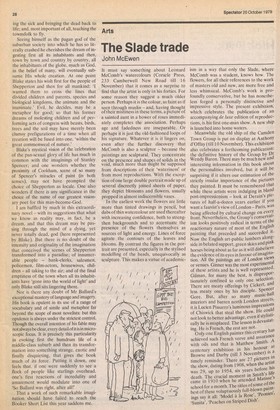God-man
Francis King
The Unlimited Dream Company J.G. Ballard (Cape £4.95) Apart from its film-studios and the trim. tamed beauty of its gardens sloping down to the river. Shepperton is an unremarkable suburban community. It is obviously because it is so unremarkable that J. G. Ballard has chosen it as the stage for the series of miracles that take place in his new novel. Blake once wrote of seeing a World in a Grain of Sand and Heaven in a Wild Flower. Mr Ballard attempts to show similar immensities through similar commonplaces.
Before he shatters the composure of ShepPerton, Mr Ballard's narrator. Blake. has been a disorientated misfit. At the age of 17. he has been expelled from the last of half-adozen schools for attempting to have a drunken orgasm with the cricket-pitch. Subsequent misadventures include being thrown out of medical school for making efforts to revive the cadaver that he has been dissecting; being arrested by the Police at the London Zoo. where. 'gripped by a Pied Piper complex'. he has tried to lend a group of 20 children and their startled mothers to a Paradise that he genuinely believes to be just around the corner; and • the ill-judged nearstrangulation of his air hostess girl-friend. He gets a job as an aircraft cleaner at West London Air Terminal, partly because of his friendship with the air hostess but chiefly because he has been Obsessed with ideas of man-powered flight and, in particular, of a man-powered circumnavigation of the world. But all his Peccadilloes and eccentricities have !nerdy been confused and aberrant Strivings to come. to terms with his real destiny: which is to be a god, no less. Blake the god is born when Blake the man dies. Having stolen a Cessna aircraft. he crash-lands it in the Thames by Shepperton. His.body, hideously lacerated and burne(j. remains at the controls in the ct:ickpit under several feet of water. while his spirit-self revives in the wet grass below the mansion in which the widowed Mrs St Cloud lives with her doctor daughter. Miriam. The first of many mirticles has .happened. Others that this deity then Performs include prodigally spilling his spermatazoa in such a manner that, having mated with all of Shepperton. he transforms it into a brilliant and dense tropical paradise — which mysteriously repels anyone from the outside world who attempts to enter it and no less mysteriously holds back any of its inhabitants who attempts to leave; filling the river with every variety of fish and the air with every variety of bird; heal ing the sick and bringing the dead back to life; and, most important of all, teaching the townsfolk to fly.
Seeing himself as the pagan god of the suburban society into which he has so literally crashed he cherishes the dream of ingesting first all its inhabitants and then, town by town and country by country, all the inhabitants of the globe, much as God, in the belief of many, will eventually subsume His whole creation. At one point Blake states his wish first for the people of Shepperton and then for all mankind: 'I wanted them to cross the lines that divided children and parents, species and biological kingdoms, the animate and the inanimate.' Evil, he decides, may be a metaphor for good; so that his former dreams of molesting children and of performing acts of congress with beasts, birds, trees and the soil may have merely been clumsy prefigurations of a time when all creation will be fused into one, 'within the great commonweal of nature.'
Blake's mystical vision of the 'celebration of the pan-sexual glory of life has much in common with the imaginings of Stanley Spencer; and one wonders whether the proximity of Cookham, scene of so many of Spencer's miracles of paint (in both senses), may not have prompted the choice of Shepperton as locale. One also wonders if there is any significance in the choice of the name of our greatest visionary poet for this man-become-God.
I am baffled by much in this extraordinary novel — with its suggestions that what we know as reality may, in fact, be a dream, and that this dream may be passing through the mind of a dying, yet never totally dead, god (here represented by Blake). But there is no doubt of the intensity and originality of the imagination that conceived the scenes of Shepperton transformed into a paradise; of innumerable people — bank-clerks, salesmen, policemen, film-actors, housewives, children 7 all taking to the air; and of the final emptiness of the town when all its inhabitants have 'gone into the world of light' and only Blake still sits lingering there.
Nor is there any doubt of Mr Ballard's exceptional mastery of language and imagery.
His book is opulent in its use of a range of vocabulary and of simile and metaphor far beyond the scope of most novelists: but this opulence is always under the strictest control.
Though the overall intention of his fable may not always be clear, every detail of it is in micro scopic focus. It is precisely this particularity in evoking first the humdrum life of a middle-class suburb and then its transformation into something strange, exotic and finally disquieting, that gives the book much of its force. Putting it down, one feels that, if one were suddenly to see a flock of people like starlings overhead, one's first reactions of incredulity and amazement would modulate into one of 'So Ballard was right, after all!'
That a work of such remarkable imagination should have failed to reach the Booker Short List this year saddens me.







































 Previous page
Previous page